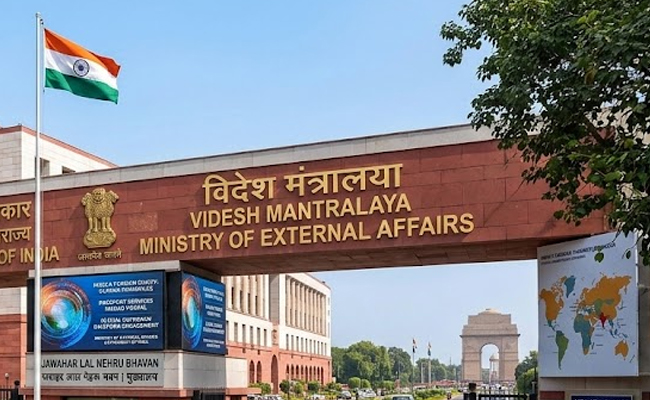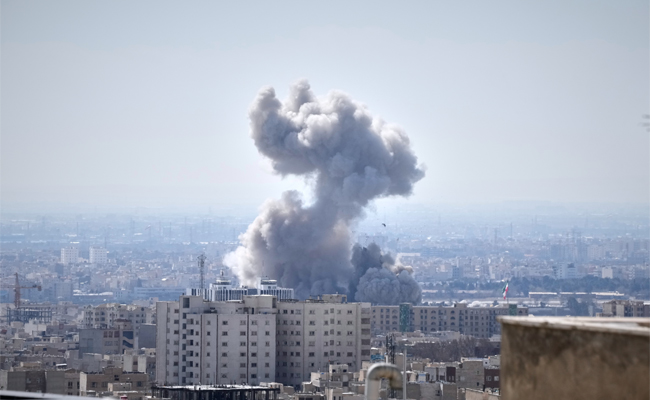Beijing, Mar 1: China has cancelled all flights to and from Pakistan and rerouted its international aircraft flying over the Pakistani airspace due to the regional tensions, official media here reported on Friday.
The closure of Pakistan's airspace in response to escalating tensions with India disrupted major routes between Europe and Southeast Asia and left thousands of air travellers stranded worldwide.
Flights from the Middle East that usually overfly Pakistan and the Pakistan-India border will have to re-route over India, Myanmar or central Asia to enter China, civil aviation experts told Global Times.
The Beijing Capital International Airport cancelled all flights to and from Pakistan on Wednesday and Thursday, including connecting flights, according to a statement sent to the Global Times by the North China Air Traffic Management Bureau.
Whether those flights will fly on Friday as scheduled is still unknown, state-run Global Times reported.
The bureau said that 22 flights fly in and out of Pakistan every week, including two from Air China and other flights from Pakistan International Airlines.
China is taking positive measures to deal with international flights after Pakistan shut down its airspace, opening part of Chinese airspace for foreign airlines to re-route.
The Civil Aviation Administration of China (CAAC) immediately launched an emergency plan to notify domestic flight companies and cooperate with the air force to ensure the safety of flights and approve temporary flight plans.
Flights to Pakistan have undergone major changes in recent days and the CAAC reminded passengers to check flight information before they make plans, the statement said.
Pakistan airspace was closed on Thursday. All international and domestic commercial flights in and out of Pakistan were canceled until further notice, according to reports from Pakistan.
Civilian aviation experts told Global Times that flights from the Middle East that usually overfly Pakistan and the Pakistan-India border will have to re-route over India, Myanmar or central Asia to enter China.
At the request of the International Civil Aviation Organisation, the CAAC opened part of China's airspace and air routes for foreign airlines to re-route, China National Radio reported.
As of 10 PM Thursday, 28 domestic airlines affected by the closure of Pakistani airspace adjusted flight plans and 49 foreign flights used Chinese airspace to re-route, the report added.
Pakistan closed its airspace after tensions escalated with India in the wake of the Pulwama attack on February 14 by Pakistan-based terror group Jaish-e-Mohammad (JeM).
India carried out air strikes against the biggest training camp of JeM in Balakot. In the operation, a very large number of JeM terrorists, trainers, senior commanders and groups of jihadis who were being trained for suicide attacks were eliminated. The facility at Balakot was headed by Yousuf Azhar, the brother-in-law of the JeM chief.
Pakistan on Wednesday claimed it shot down two Indian fighter jets over Pakistani air space and arrested a pilot. Later, Prime Minister Khan said that Pakistan will release the pilot as a goodwill gesture.
Let the Truth be known. If you read VB and like VB, please be a VB Supporter and Help us deliver the Truth to one and all.
New Delhi (PTI): The Ministry of External Affairs (MEA) has set up a control room to assist those affected by the escalating crisis in West Asia.
The MEA has said almost one crore Indian citizens live in West Asia and their safety and well-being is of "utmost priority" for New Delhi.
As the Iran-US conflict widened, the Indian embassy in Iran moved hundreds of Indian students from the Iranian capital of Tehran to safer locations.
"A Control Room has been set up in the Ministry of External Affairs in view of the current situation in West Asia and the Gulf region," the MEA said on Wednesday.
"The Control Room can be contacted from 9 am to 9 pm at: 1800118797 (Toll Free) +91 11 2301 2113, +91 11 2301 4104, +91 11 2301 7905," it added.
The US launched military strikes on Iran on February 28, killing Iranian Supreme leader Ali Khamenei.
Following the military offensive, Iran has carried out a wave of attacks mainly targeting Israel and American military bases in several Gulf countries, including the UAE, Bahrain, Kuwait, Jordan and Saudi Arabia.
The MEA on Tuesday noted that almost one crore Indian citizens live and work in the Gulf region, and their "safety and well-being is of utmost priority."
"We cannot be impervious to any development that negatively affects them," it said.
The MEA said New Delhi will continue to closely monitor the evolving situation and take relevant decisions in the national interest, adding it is in touch with the governments in the region as well as other key partners.
A Special Control Room has been set up in the Ministry of External Affairs in view of the current situation in West Asia and the Gulf region. Details are as below ⬇️
— Randhir Jaiswal (@MEAIndia) March 4, 2026
🔗 https://t.co/nK3d6SY9Pa pic.twitter.com/v2EhUI5B1x




